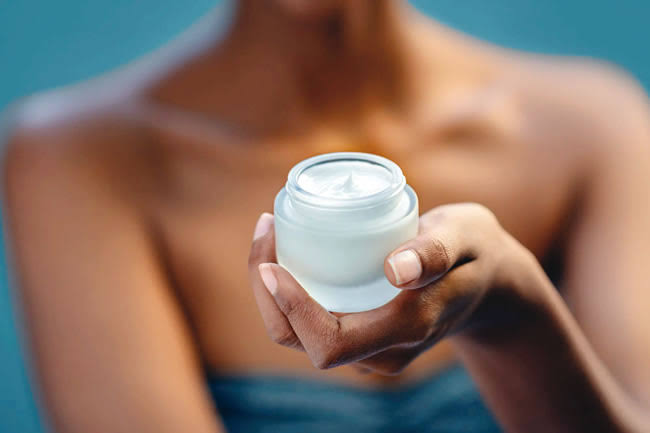Written by Nkuku Esther
The Hidden Dangers of Skin-lightening Creams: A Link to Kidney Disease
In recent years, the desire for fairer skin has led to the widespread use of skin-lightening or bleaching creams in many parts of the world. While these products promise to lighten skin tone and reduce the appearance of blemishes, they often come with a hidden cost to one’s health. Research has shown a concerning link between the use of skin-lightening creams and the development of kidney disease, shedding light on the dangers of these products beyond their cosmetic effects.
Skin-lightening creams typically contain ingredients such as hydroquinone, corticosteroids, mercury, and even certain acids like alpha hydroxy acids (AHAs) or beta hydroxy acids (BHAs). These ingredients work by inhibiting melanin production, which gives the skin its colour. While some of these creams are available over the counter, others may be obtained through prescription or from unregulated sources.
The Link to Kidney Disease
Several studies have highlighted the association between the use of skin-lightening creams and the development of kidney disease. One study published in the Journal of the American Academy of Dermatology found that women who used skin-lightening creams had a significantly higher risk of developing kidney disease compared to those who did not use these products. The researchers suggested that the toxic ingredients in these creams, such as mercury, could be responsible for damaging the kidneys over time.
Mercury is one of the most concerning ingredients found in some skin-lightening creams. Chronic mercury exposure can lead to kidney damage, among other serious health effects. The kidneys play a crucial role in filtering toxins from the body, but prolonged exposure to mercury can overwhelm their ability to function properly, leading to kidney dysfunction or failure.
Other Health Risks
In addition to kidney disease, the use of skin-lightening creams has been linked to a host of other health risks. These include skin irritation, thinning of the skin, uneven pigmentation, increased risk of skin cancer, and systemic toxicity from ingredients like hydroquinone and corticosteroids. Furthermore, the societal pressure to conform to certain beauty standards perpetuates the use of these harmful products, exacerbating the problem.
Promoting Skin Health and Diversity
It is essential to raise awareness about the dangers of skin-lightening creams and to promote healthy attitudes towards skin colour and diversity. Embracing one’s natural skin tone and practicing good skincare habits can help maintain healthy and radiant skin without resorting to potentially harmful products. Additionally, governments and regulatory bodies must enforce stricter regulations on the production and sale of skin-lightening creams to protect consumers from exposure to toxic ingredients.
Choosing a Healthy Eating Lifestyle over bleaching creams
In a world where societal standards often dictate beauty norms, many individuals feel pressured to alter their appearance to fit an idealized image. One common practice is the use of bleaching or skin-lightening creams to achieve a lighter complexion. However, instead of resorting to potentially harmful products, there is a more sustainable and healthier approach to enhancing one’s appearance: adopting a nutritious eating lifestyle.
Nourishing Your Skin from the Inside Out
The phrase “you are what you eat” holds when it comes to skin health. Consuming a diet rich in fruits, vegetables, whole grains, lean proteins, and healthy fats provides essential nutrients that support skin health and radiance. Nutrients like vitamins A, C, and E, as well as antioxidants and omega-3 fatty acids, help protect the skin from damage, promote collagen production, and maintain its elasticity.
The Impact of Nutrition on Skin Tone
Research suggests that certain dietary patterns can influence skin pigmentation and overall complexion. For instance, a study published in the American Journal of Clinical Nutrition found that a diet high in fruits and vegetables was associated with a more favourable skin tone, characterized by a healthier glow and less redness. Conversely, diets high in processed foods, sugar, and unhealthy fats have been linked to skin issues like acne and dullness.
Hydration for Healthy Skin
In addition to eating a nutrient-rich diet, staying hydrated is essential for maintaining healthy skin. Water helps flush out toxins from the body, keeps the skin hydrated and plump, and supports proper circulation, which can improve skin tone and texture. Aim to drink plenty of water throughout the day and incorporate hydrating foods like cucumbers, watermelon, and leafy greens into your meals.
In conclusion, while the quest for fairer skin may be tempting, the risks associated with skin-lightening creams, including their link to kidney disease, cannot be ignored. It is crucial to prioritize health and well-being over cosmetic ideals and to promote acceptance and appreciation of diverse skin tones. By educating ourselves and others about the dangers of these products, we can work towards a future where everyone feels confident and beautiful in their skin, without jeopardizing their health in the process. If you’re struggling with skin issues or are unsure about how to improve your diet for better skin health, consider consulting with a dermatologist or registered dietitian. These professionals can provide personalized recommendations tailored to your unique needs and goals, helping you achieve radiant skin from the inside out.
Instead of risking your health with potentially harmful bleaching creams, consider choosing a healthy eating lifestyle to enhance your appearance naturally. By nourishing your body with nutrient-rich foods and staying hydrated, you can support healthy, glowing skin while embracing your natural beauty. Remember, true beauty comes from within, and by prioritizing your health and well-being, you’ll radiate confidence and self-love from the inside out.




